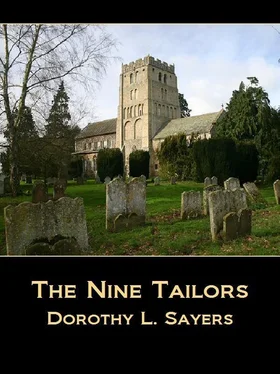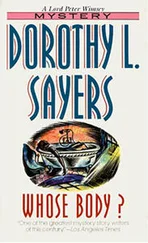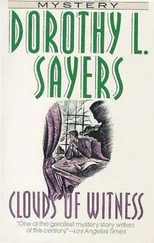Dorothy Sayers - The Nine Tailors
Здесь есть возможность читать онлайн «Dorothy Sayers - The Nine Tailors» весь текст электронной книги совершенно бесплатно (целиком полную версию без сокращений). В некоторых случаях можно слушать аудио, скачать через торрент в формате fb2 и присутствует краткое содержание. Жанр: Классический детектив, на английском языке. Описание произведения, (предисловие) а так же отзывы посетителей доступны на портале библиотеки ЛибКат.
- Название:The Nine Tailors
- Автор:
- Жанр:
- Год:неизвестен
- ISBN:нет данных
- Рейтинг книги:3 / 5. Голосов: 1
-
Избранное:Добавить в избранное
- Отзывы:
-
Ваша оценка:
- 60
- 1
- 2
- 3
- 4
- 5
The Nine Tailors: краткое содержание, описание и аннотация
Предлагаем к чтению аннотацию, описание, краткое содержание или предисловие (зависит от того, что написал сам автор книги «The Nine Tailors»). Если вы не нашли необходимую информацию о книге — напишите в комментариях, мы постараемся отыскать её.
The Nine Tailors — читать онлайн бесплатно полную книгу (весь текст) целиком
Ниже представлен текст книги, разбитый по страницам. Система сохранения места последней прочитанной страницы, позволяет с удобством читать онлайн бесплатно книгу «The Nine Tailors», без необходимости каждый раз заново искать на чём Вы остановились. Поставьте закладку, и сможете в любой момент перейти на страницу, на которой закончили чтение.
Интервал:
Закладка:
Wimsey had determined that he would never go back to Fenchurch St. Paul. His memories of it were disquieting, and he felt that there were one or two people in that parish who would be better pleased if they never saw his face again. But when Hilary Thorpe wrote to him and begged him to come and see her during her Christmas holidays, he felt bound to go. His position with regard to her was peculiar. Mr. Edward Thorpe, as Trustee under her father’s will and her natural guardian, had rights which no court of law would gainsay; on the other hand Wimsey, as sole trustee to the far greater Wilbraham estate, held a certain advantage. He could, if he chose, make things awkward for Mr. Thorpe. Hilary possessed written evidence of her father’s wishes about her education, and Uncle Edward could scarcely now oppose them on the plea of lack of funds. But Wimsey, holding the purse-strings, could refuse to untie them unless those wishes were carried out. If Uncle Edward chose to be obstinate, there was every prospect of a legal dog-fight; but Wimsey did not believe that Uncle Edward would be obstinate to that point. It was in Wimsey’s power to turn Hilary from an obligation into an asset for Uncle Edward, and it seemed very possible that he would pocket his principles and take the cash. Already he had shown signs of bowing to the rising sun; he had agreed to take Hilary down to spend Christmas at the Red House, instead of with him in London. It was, indeed, not Mr. Thorpe’s fault that the Red House was available; he had done his best to let it, but the number of persons desirous of tenanting a large house in ill-repair, situated in a howling desert and encumbered with a dilapidated and heavily mortgaged property, was not very large. Hilary had her way, and Wimsey, while heartily wishing that the whole business could have been settled in London, liked the girl for her determination to stick to the family estate. Here again, Wimsey was a power in the land. He could put the property in order if he liked and pay off the mortgages, and that would no doubt be a satisfaction to Mr. Thorpe, who had no power to sell under the terms of his trust. A final deciding factor was that if Wimsey did not spend Christmas at Fenchurch, he would have no decent excuse for not spending it with his brother’s family at Denver, and of all things in the world, a Christmas at Denver was most disagreeable to him.
Accordingly, he looked in at Denver for a day or two, irritated his sister-in-law and her guests as much as, and no more than, usual and thence, on Christmas Eve, made his way across country to Fenchurch St. Paul.
“They seem,” said Wimsey, “to keep a special brand of disgusting weather in these parts.” He thrust up his hand against the hood of the car, discharging a deluge of water. “Last time it was snowing and now it’s pelting cats and dogs. There’s a fate in it, Bunter.”
“Yes, my lord,” said that long-suffering man. He was deeply attached to his master, but sometimes felt his determined dislike of closed cars to be a trifle unreasonable. “A very inclement season, my lord.”
“Well, well, we must push on, push on. A merry heart goes all the way. You don’t look very merry, Bunter, but then you’re one of those sphinx-like people. I’ve never seen you upset, except about that infernal beer-bottle.”
“No, my lord. That hurt my pride very much, if I may say so. A very curious circumstance, that, my lord.”
“Pure accident, I think, though it had a suspicious appearance at the time. Whereabouts are we now? Oh, yes, Lympsey, of course; we cross over the Great Leam here by the Old Bank Sluice. We must be just coming to it. Yes, there it is. By Jove! some water coming through here!”
He pulled up the car just beyond the bridge, got out and stood in the downpour staring at the sluice. Its five great gates were open, the iron ratchets on the bridge above drawn up to their full extent. Dark and menacing, the swollen flood-water raced through the sluices, eddying and turning and carrying with them the brown reeds and broken willow-stems and here and there fragments of timber filched from the drowned lands of the Upper Fen. And even while he watched, there came a change. Angry little waves and gurgles ruffled the strong flow of the river, with an appearance as of repressed tumult and conflict. A man came out of the gate-house by the bridge and took up his position by the sluice, staring down into the river. Wimsey hailed him.
“Tide coming up?”
“Yes, sir. We has to watch her now if we don’t want to get the water all across the causey. But she don’t rise very far, not without there’s an extraordinary high spring tide. She’s just coming up to springs now, so we has to do a bit of manipulation, like.” He turned, and began to wind down the sluices.
“You see the idea, Bunter. If they shut this sluice, all the upland water has to go by the Old Leam, which has enough to do as it is. But if they leave it open and the tide’s strong enough to carry the flood-water back with it through the sluice, they’ll drown all the country above the sluice.”
“That’s it, sir,” said the man with a grin. “And if the flood-water carries the tide back, we might drown you. It all depends, you see.”
“Then we’ll hope you manipulate things in our favour,” said Wimsey, cheerfully. The rush of water through the arches was slackening now with the lowering of the sluice-gates, the whirlpools became shallower, and the floating sticks and reeds began to eddy against the piles of the bridge. “Just hold her back for a bit till we get to Fenchurch, there’s a good fellow.”
“Oh, we’ll keep her level, don’t you be afraid,” said the man, reassuringly. “There ain’t nothing wrong wi’ this here sluice.”
He put such marked emphasis on the word “this” that Wimsey looked sharply at him.
“How about Van Leyden’s Sluice?”
The man shook his head.
“I dunno, sir, but I did hear as old Joe Massey down there were in a great taking about they old gates of his. There was three gentlemen went down yesterday to look at ’em — from the Conservancy or the Board or something o’ that, I reckon. But you can’t do nothing much for they gates in flood-time. Mebbe they’ll hold, mebbe they won’t. It’s all according.”
“Well, that’s jolly,” said Wimsey. “Come on, Bunter. Have you made your will? We’d better go while the going’s good.”
Their way this time lay along the south bank or Fenchurch side of the Thirty-foot. Dyke and drain were everywhere abrim and here and there the water stood in the soaked fields as though they needed but little more to sink back into their ancient desolation of mere and fen. There was little movement on the long, straight road. Here a shabby car met them, splashed with mud and squirting water from every pot-hole; here a slow farm cart plodded ahead with a load of mangel-wurzels, the driver huddled under the rough protection of a sodden sack, and deaf and blind to overtaking traffic; there a solitary labourer, bent with rheumatism, slouched homeward dreaming of fire and beer at the nearest pub. The air was so heavy with water, that not till they had passed Frog’s Bridge did they hear the sweet, dull jangle of sound that told them that the ringers were practising their Christmas peal; it drifted through the streaming rain with an aching and intolerable melancholy, like the noise of the bells of a drowned city pulsing up through the overwhelming sea.
They turned the corner beneath the great grey tower and passed by the Rectory wall. As they neared the gate a blast of familiar toots smote upon their ears, and Wimsey slackened speed as the Rector’s car came cautiously nosing its way into the road. Mr. Venables recognised the Daimler immediately, and stopped his engine with the Morris halfway across the road. His hand waved cheerfully to them through the side-curtains.
Читать дальшеИнтервал:
Закладка:
Похожие книги на «The Nine Tailors»
Представляем Вашему вниманию похожие книги на «The Nine Tailors» списком для выбора. Мы отобрали схожую по названию и смыслу литературу в надежде предоставить читателям больше вариантов отыскать новые, интересные, ещё непрочитанные произведения.
Обсуждение, отзывы о книге «The Nine Tailors» и просто собственные мнения читателей. Оставьте ваши комментарии, напишите, что Вы думаете о произведении, его смысле или главных героях. Укажите что конкретно понравилось, а что нет, и почему Вы так считаете.












